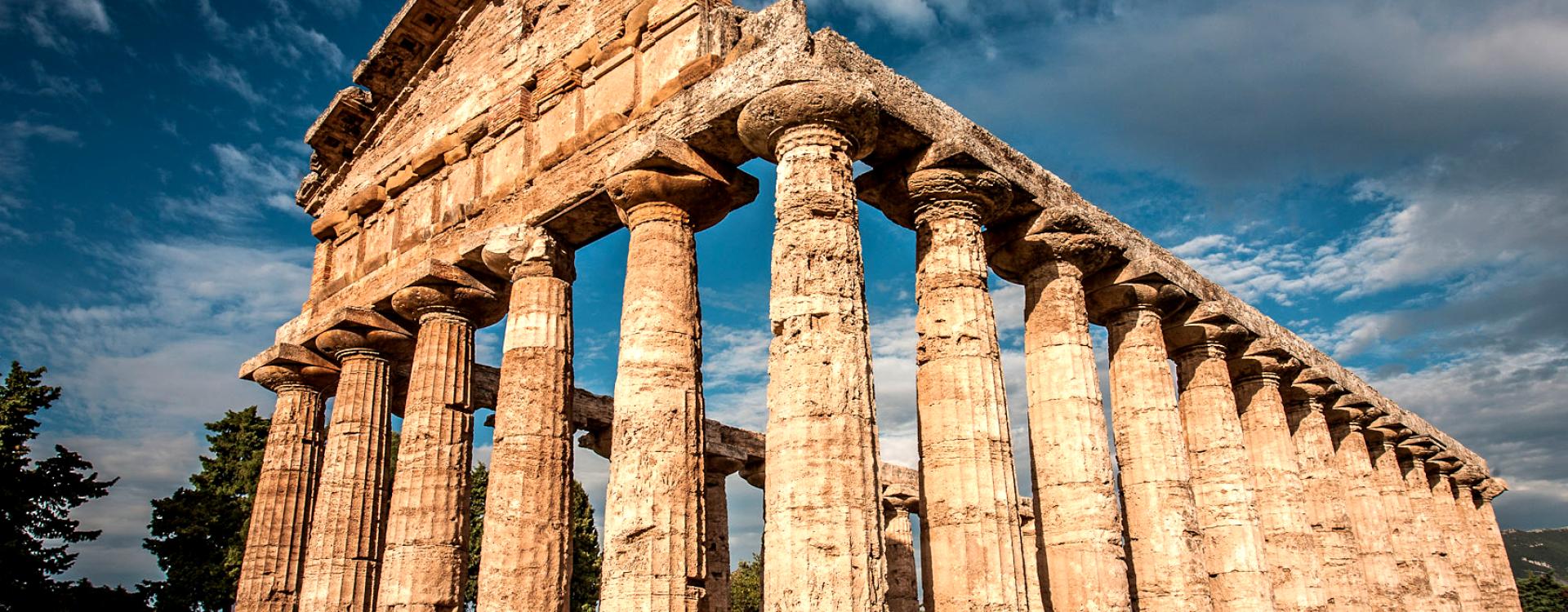Paestum
PAESTUM
Paestum has been for a thousand years a romantic ruin in the midst of a solemn wilderness. Its Doric temples, hardly surpassed even by those of Athens in noble simplicity and good preservation, produce an incomparable effect of majestry and grandeur.
The ancient site is set in a grassy field surrounded by gardens and hills, south of Salerno, at the bottom of the Piana del Sele. Although the site is small, it's so charming that you may want to spend time just relaxing here. The museum is also exceptional.
Paestum, or Poseidonia as it was known, was founded by the Greeks from Sybaris in the sixth century BC, and later in 273 BC, colonised by the Romans, who Latinised the name. By the ninth century a combination of maleria and Saracen raids had decimated the population and left the buildings deserted and gradually overtaken by the thick forest, so the site was not rediscovered until the eighteenth century during the building of a road through here. Paestum is a desolate, eerie place which boasts three golden-stoned temples. Of these, the temple of Neptune, dating from about 450 BC, is the most complete, with only its roof and parts of the inner walls missing. The Basilica of Hera, built a century or so earlier, retains its doule row of columns, while the temple of Ceres at the northern end of the sire was used as a Christian church for a time, though it is now sectioned off from the public.
The museum across the road holds finds excavated from the site and around, including a set of archaic period Greek metopes. You should see the fourth-century ceramics and the tomb paintings at the back of the building, one of which, from the so-called "Tomb of the Diver", a graceful and expressively naturalistic piece of work, is possibly the only existing example of Greek wall painting in Italy.
While you are exploring Paestum, keep an eye out too for the wild flowers. More that one nineteenth-century traveller claimed to have found descendents of Paestum's famous rose growing wild, and some may stil be around.
See all
Paestum has been for a thousand years a romantic ruin in the midst of a solemn wilderness. Its Doric temples, hardly surpassed even by those of Athens in noble simplicity and good preservation, produce an incomparable effect of majestry and grandeur.
The ancient site is set in a grassy field surrounded by gardens and hills, south of Salerno, at the bottom of the Piana del Sele. Although the site is small, it's so charming that you may want to spend time just relaxing here. The museum is also exceptional.
Paestum, or Poseidonia as it was known, was founded by the Greeks from Sybaris in the sixth century BC, and later in 273 BC, colonised by the Romans, who Latinised the name. By the ninth century a combination of maleria and Saracen raids had decimated the population and left the buildings deserted and gradually overtaken by the thick forest, so the site was not rediscovered until the eighteenth century during the building of a road through here. Paestum is a desolate, eerie place which boasts three golden-stoned temples. Of these, the temple of Neptune, dating from about 450 BC, is the most complete, with only its roof and parts of the inner walls missing. The Basilica of Hera, built a century or so earlier, retains its doule row of columns, while the temple of Ceres at the northern end of the sire was used as a Christian church for a time, though it is now sectioned off from the public.
The museum across the road holds finds excavated from the site and around, including a set of archaic period Greek metopes. You should see the fourth-century ceramics and the tomb paintings at the back of the building, one of which, from the so-called "Tomb of the Diver", a graceful and expressively naturalistic piece of work, is possibly the only existing example of Greek wall painting in Italy.
While you are exploring Paestum, keep an eye out too for the wild flowers. More that one nineteenth-century traveller claimed to have found descendents of Paestum's famous rose growing wild, and some may stil be around.
See all
AL MOMENTO NON SONO PRESENTI NEWS
